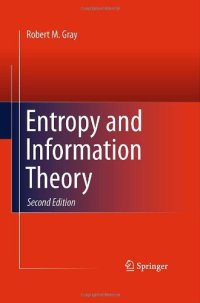
Ebook: Entropy and Information Theory
Author: Robert M. Gray (auth.)
- Genre: Computers // Algorithms and Data Structures
- Tags: Signal Image and Speech Processing, Communications Engineering Networks, Statistics for Engineering Physics Computer Science Chemistry and Earth Sciences, Probability Theory and Stochastic Processes, Coding and Information Theory
- Year: 2011
- Publisher: Springer US
- Edition: 2
- Language: English
- pdf
This book is an updated version of the information theory classic, first published in 1990. About one-third of the book is devoted to Shannon source and channel coding theorems; the remainder addresses sources, channels, and codes and on information and distortion measures and their properties.
New in this edition:
- Expanded treatment of stationary or sliding-block codes and their relations to traditional block codes
- Expanded discussion of results from ergodic theory relevant to information theory
- Expanded treatment of B-processes -- processes formed by stationary coding memoryless sources
- New material on trading off information and distortion, including the Marton inequality
- New material on the properties of optimal and asymptotically optimal source codes
- New material on the relationships of source coding and rate-constrained simulation or modeling of random processes
Significant material not covered in other information theory texts includes stationary/sliding-block codes, a geometric view of information theory provided by process distance measures, and general Shannon coding theorems for asymptotic mean stationary sources, which may be neither ergodic nor stationary, and d-bar continuous channels.
This book is an updated version of the information theory classic, first published in 1990. About one-third of the book is devoted to Shannon source and channel coding theorems; the remainder addresses sources, channels, and codes and on information and distortion measures and their properties.
New in this edition:
- Expanded treatment of stationary or sliding-block codes and their relations to traditional block codes
- Expanded discussion of results from ergodic theory relevant to information theory
- Expanded treatment of B-processes -- processes formed by stationary coding memoryless sources
- New material on trading off information and distortion, including the Marton inequality
- New material on the properties of optimal and asymptotically optimal source codes
- New material on the relationships of source coding and rate-constrained simulation or modeling of random processes
Significant material not covered in other information theory texts includes stationary/sliding-block codes, a geometric view of information theory provided by process distance measures, and general Shannon coding theorems for asymptotic mean stationary sources, which may be neither ergodic nor stationary, and d-bar continuous channels.